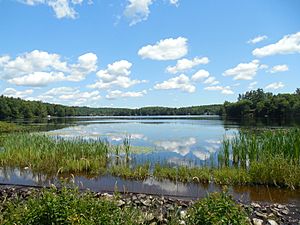Pearly Lake facts for kids
Quick facts for kids Pearly Lake |
|
|---|---|
| Tarbell Pond | |
 |
|
| Location | Cheshire County, New Hampshire |
| Coordinates | 42°46′31″N 72°3′37″W / 42.77528°N 72.06028°W |
| Primary outflows | Tarbell Brook |
| Basin countries | United States |
| Max. length | 1.4 mi (2.3 km) |
| Max. width | 0.3 mi (0.48 km) |
| Surface area | 191.5 acres (0.8 km2) |
| Average depth | 7 ft (2.1 m) |
| Max. depth | 17 ft (5.2 m) |
| Surface elevation | 1,007 feet (307 m) |
| Settlements | Rindge |
Pearly Lake, also known as Pearly Pond, is a beautiful lake located in the town of Rindge. This area is in Cheshire County, in the southwestern part of New Hampshire, United States. The lake covers about 192 acres, which is a big area of water!
Pearly Lake used to be called Tarbell Pond. It was named after Samuel Tarbell, a brave soldier who fought in the American Revolutionary War. This lake is an important starting point for Tarbell Brook. This brook flows into the Millers River, which then joins the mighty Connecticut River.
Discovering Pearly Lake
Pearly Lake is a great place to explore and learn about nature. It's a freshwater lake, meaning its water is not salty like the ocean. The lake is about 1.4 miles (2.3 kilometers) long and 0.3 miles (0.5 kilometers) wide. At its deepest point, it goes down about 17 feet (5.2 meters).
Location and Surroundings
Pearly Lake is nestled in a scenic part of New Hampshire. The lake is surrounded by natural beauty, including forests and hills. It's a peaceful spot, perfect for enjoying the outdoors.
An interesting fact about the lake's surroundings is that the main campus of Franklin Pierce University is right on its northeast shore. This means students get to enjoy beautiful lake views every day!
Who Lives in the Lake?
Pearly Lake is known as a warmwater fishery. This means its waters are a good home for fish that prefer warmer temperatures. It's a popular spot for fishing!
You can find many different kinds of fish swimming in Pearly Lake, including:
These fish make the lake a lively ecosystem. They also provide fun for people who enjoy fishing.
 | Selma Burke |
 | Pauline Powell Burns |
 | Frederick J. Brown |
 | Robert Blackburn |



